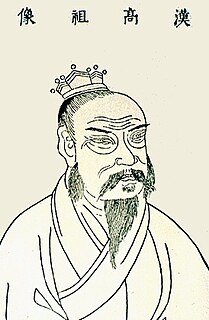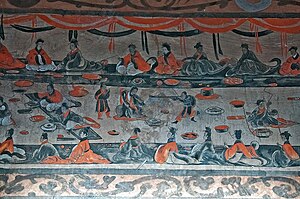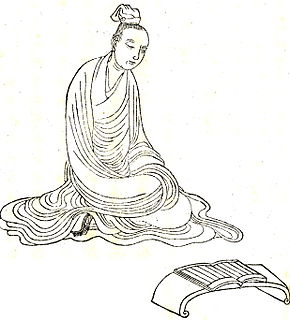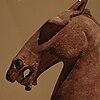
Emperor Gaozu of Han, born Liu Bang (劉邦), was the founder and first emperor of the Han dynasty, reigning from 202 – 195 BCE. "Gaozu of Han" is his temple name, meaning "The High Ancestor of Han". Liu Bang was one of the few dynasty founders in Chinese history who was born in a peasant family.

Xiang Ji, courtesy name Yu, better known as Xiang Yu, was a prominent warlord who lived in the late Qin dynasty. A noble of Xiaxiang, Xiang Yu was granted the title of "Duke of Lu" (魯公) by King Huai II of the insurgent Chu state in 208 BC. The following year, he led the rebel forces to victory at the Battle of Julu against the Qin armies led by Zhang Han. After the fall of the Qin dynasty, Xiang Yu proclaimed himself "Hegemon-King of Western Chu" and ruled a vast area of land covering parts of present-day Shanxi, Henan, Hubei, Hunan and Jiangsu, with Pengcheng as his capital. He engaged Liu Bang, the founding emperor of the Han dynasty, in a long struggle for power, known as the Chu–Han Contention, which concluded with his eventual defeat at the Battle of Gaixia. He committed suicide at the bank of the Wu River.
Zhang Han was a military general of the Qin dynasty. When uprisings erupted throughout China during the reign of Qin Er Shi, Zhang Han led the Qin armies and successfully quelled several of these rebel forces. In 207 BC, Zhang Han was defeated by Xiang Yu of Chu at the Battle of Julu, after which he surrendered along with his 200,000 troops. He was conferred the title "King of Yong" (雍王) by Xiang Yu and given part of the lands in Guanzhong as his fief when Xiang split the former Qin Empire into the Eighteen Kingdoms after the fall of the Qin dynasty. Zhang Han's territory was conquered by Liu Bang in 206 BC, and he committed suicide a year later.

Xiao He was a Chinese statesman of the early Western Han dynasty. He served Liu Bang, the founder of the Han dynasty, during the insurrection against the Qin dynasty, and fought on Liu's side in the Chu–Han Contention against Liu's rival, Xiang Yu. After the founding of the Han dynasty, Xiao He became the chancellor and held office until his death. For his contributions, he is also known as one of the "Three Heroes of the early Han dynasty" (漢初三傑), along with Han Xin and Zhang Liang.
Emperor Yi of Chu, also known as King Huai II of Chu before receiving his de jure emperor title, personal name Xiong Xin, was the ruler of the Chu state in the late Qin dynasty. He was a grandson of King Huai of Chu. In 223 BC, during the Warring States period, the Chu state was conquered by the Qin state, which unified the various Chinese feudal states in a series of wars and established the Qin dynasty in 221 BC. In 209 BC, when rebellions broke out throughout China to overthrow the Qin dynasty, the Chu state was revived as an insurgent state against Qin imperial rule. Xiong Xin was discovered by Xiang Liang, a rebel leader who descended from a famous Chu general, and installed on the Chu throne as "King Huai II of Chu". However, Xiong Xin was merely a puppet ruler because power was concentrated in Xiang Liang's hands, and was later passed on to Xiang Liang's nephew, Xiang Yu, after Xiang Liang was killed in battle. In 206 BC, the Qin dynasty was overthrown by the rebels, after which Xiang Yu, who was the de facto leader of all the rebel forces, divided the former Qin Empire into the Eighteen Kingdoms. He promoted King Huai II to a more "honourable" title – Emperor Yi of Chu – and made him the nominal sovereign ruler over all the Eighteen Kingdoms. Xiang Yu then had Emperor Yi relocated to Chen County and secretly ordered Ying Bu to assassinate the emperor during the journey.

Fan Kuai was a military general of the early Western Han dynasty. He was a prominent figure of the Chu–Han Contention, a power struggle for supremacy over China between the Han dynasty's founder, Liu Bang, and his rival, Xiang Yu.

The Battle of Julu was fought in Julu in 207 BC primarily between forces of the Qin dynasty and the insurgent state of Chu. The Qin commander was Zhang Han, while the Chu leader was Xiang Yu. The battle concluded with a decisive victory for the rebels over the larger Qin army. The battle marked the decline of Qin military power as the bulk of Qin's armies were destroyed in this battle.

The Story of Han Dynasty is a Chinese television series based on the events in the Chu–Han Contention, an interregnum between the fall of the Qin dynasty and the founding of the Han dynasty in Chinese history. The series was first broadcast on CCTV in China in 2003. Directed by Wei Handao, the series starred Hu Jun, Xiao Rongsheng, Jacklyn Wu, Kristy Yang, Wang Gang and Li Li-chun.
Xiang Zhuang was a younger cousin of Xiang Yu, the "Hegemon-King of Western Chu". He fought on Chu's side as a military general during the Chu–Han Contention, a power struggle for supremacy over China between Xiang Yu and Liu Bang, the founder of the Han dynasty. Little is known about Xiang Zhuang, except for his role at the Feast at Hong Gate in 206 BC.
Sima Xin was a military general of the Qin dynasty. He surrendered to Xiang Yu after the Battle of Julu in 207 BC. In 206 BC, following the collapse of the Qin dynasty, he was conferred the title of "King of Sai" by Xiang Yu and given part of the lands in Guanzhong as his fief when the latter split the former Qin Empire into the Eighteen Kingdoms.
Dong Yi was a military general of the Qin dynasty. He surrendered to Xiang Yu after the Battle of Julu in 207 BC. In 206 BC, following the collapse of the Qin dynasty, he was conferred the title of "King of Di" (翟王) by Xiang Yu and given part of the lands in Guanzhong as his fief when the latter split the former Qin Empire into the Eighteen Kingdoms.

The Great Conqueror's Concubine, alternatively known as King of Western Chu, is a historical drama film directed by Stephen Shin and Wei Handao, starring Ray Lui, Rosamund Kwan, Zhang Fengyi and Gong Li. The film is based on the events in the Chu–Han Contention, an interregnum between the fall of the Qin dynasty and the founding of the Han dynasty.

White Vengeance, also known as Hong Men Yan, is a 2011 Chinese historical film directed by Daniel Lee, starring Leon Lai, Feng Shaofeng, Liu Yifei, Zhang Hanyu, Anthony Wong, Jordan Chan, Andy On, Xiu Qing and Jia Qing. The film is loosely based on events in the Chu–Han Contention, an interregnum between the fall of the Qin dynasty and the founding of the Han dynasty in Chinese history. The film's Chinese title is a reference to the Feast at Hong Gate, one of the highlights of that era.

King's War, also known as Legend of Chu and Han, is a Chinese television series based on the events in the Chu–Han Contention, an interregnum between the fall of the Qin dynasty and the founding of the Han dynasty. It started airing on Anhui TV, Zhejiang TV, Jiangxi TV and Tianjin TV on 28 December 2012.

Chu Han Zhengxiong is a Chinese television series directed by Chen Jialin. The plot, based on the historical novel of the same Chinese title by Xiong Cheng (熊誠), retells the events in the Chu–Han Contention, an interregnum between the fall of the Qin dynasty and the founding of the Han dynasty. Shooting for the series started in October 2011 at the Jiaozuo Film and Television City. It was released in China on 27 November 2012.
Ying Bu was a warlord and vassal king who lived in the early Western Han dynasty. He was a native of Lu County. In his early life under the Qin dynasty, Ying Bu was convicted and sentenced to qing, so he was also called Qing Bu (黥布). He was then sent to Mount Li to perform hard labour by constructing Qin Shi Huang's mausoleum. He later escaped with some men and became the leader of a bandit gang. Ying Bu participated in the insurrection against the Qin dynasty after the Dazexiang Uprising broke out in 209 BC. After the uprising failed, he became part of a rebel force led by Xiang Liang. He assisted Xiang Liang's nephew and successor Xiang Yu in overthrowing the Qin dynasty. After the fall of Qin, he initially fought on Xiang Yu's side in the Chu–Han Contention, a power struggle for supremacy over China between Xiang Yu and Liu Bang. However, later, he defected to Liu Bang's side and helped Liu defeat Xiang Yu and become the emperor. During this period of time, Ying Bu held the title "King of Jiujiang". After Liu Bang established the Han dynasty in 202 BC, he appointed Ying Bu as a vassal king and granted him the title "King of Huainan". In 195 BC, Ying Bu rebelled against the Han dynasty but was defeated and killed.

The Last Supper is a 2012 Chinese historical film directed by Lu Chuan. The plot is based on events in the Chu–Han Contention, an interregnum between the fall of the Qin dynasty and the founding of the Han dynasty in Chinese history. The film was originally scheduled to be released on 5 July 2012, but was delayed. It premiered at the Toronto International Film Festival on 8 September 2012.


























